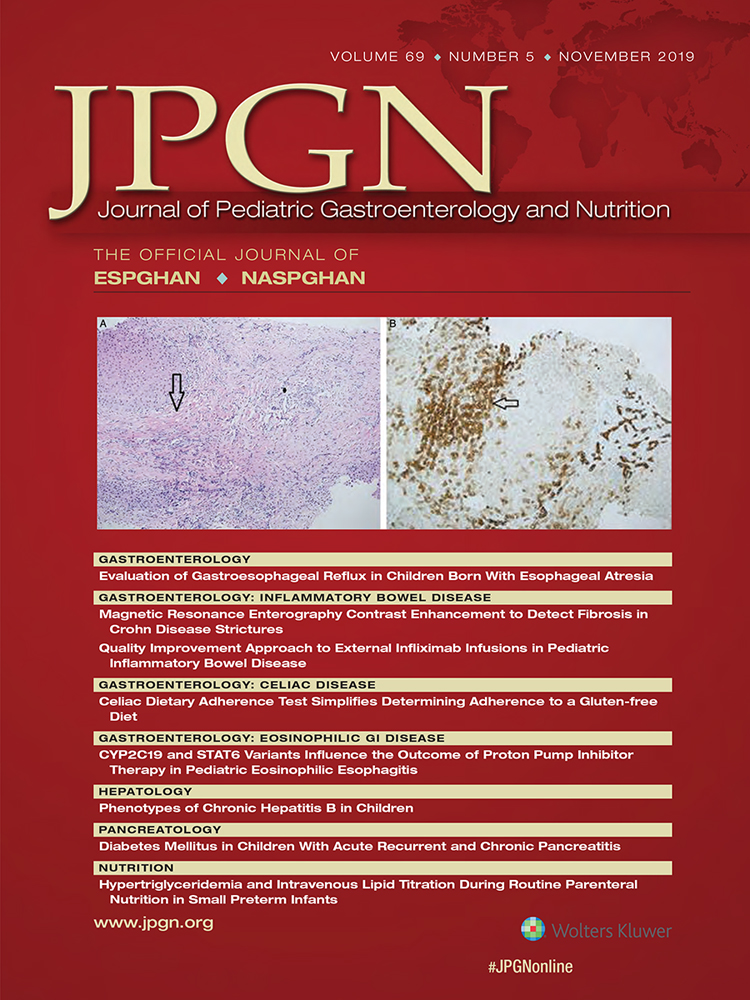Serologic, but Not Genetic, Markers Are Associated With Impaired Anthropometrics at Diagnosis of Pediatric Crohn's Disease
Supplemental digital content is available for this article. Direct URL citations appear in the printed text, and links to the digital files are provided in the HTML text of this article on the journal's Web site (www.jpgn.org).
Funding for statistical support was received through the Pediatric Gastroenterology Departmental Grant at Riley Hospital for Children. As an ancillary study of the RISK Stratification Project, there was funding received from the RISK Consortium grant from the Crohn's and Colitis Foundation.
L.A.D. receives grant support from Janssen Pharmaceuticals, Inc. J.S.H. is on the advisory board for Janssen Pharmaceuticals, Inc and AbbVie, Inc. He is a consultant for Pfizer, Inc, Roche, Allergan, Receptos, Inc, Lilly, and Boehringer Ingelheim.
The remaining authors report no conflicts of interest.
**Membership of the PRO-KIIDS Research Group is listed in the acknowledgements.
ABSTRACT
Objectives:
Children with Crohn's disease may present with malnutrition and linear growth impairment, which can be secondary to insufficient caloric intake, chronic inflammation, malabsorption, and suppression of growth-promoting hormones. We evaluated clinical, serologic, and genetic data to determine risk factors for impaired anthropometrics in Crohn's disease at diagnosis.
Methods:
Our study evaluated 772 children newly diagnosed with Crohn's disease, inflammatory phenotype, enrolled in the RISK Stratification Project to determine the factors associated with anthropometric impairment. Data were collected on demographics, growth parameters, disease location, serologic and immunologic markers, and disease severity. We performed a genome-wide association study of genetic polymorphisms associated with inflammatory bowel disease. Regression analysis determined associations between anthropometrics and clinical, serologic, and genetic variables.
Results:
There were 59 (7%) children with height z score <−2, 126 (14%) with a weight z score <−2, and 156 (17%) with a body mass index z score <−2. Linear growth impairment was associated with hypoalbuminemia (P = 0.0052), elevated granulocyte-macrophage colony stimulating factor autoantibodies (P = 0.0110), and elevated CBir antibodies against flagellin (P = 0.0117). Poor weight gain was associated with female sex (P = 0.0401), hypoalbuminemia (P = 0.0162), and thrombocytosis (P = 0.0081). Malnutrition was associated with hypoalbuminemia (P = 0.0061) and thrombocytosis (P = 0.0011). Children with moderate or severe disease had lower weight (P = 0.02 and P = 1.16×10−6, respectively) and body mass index z scores (P = 2.7 × 10−3 and P = 1.01 × 10−6, respectively) than children with quiescent and mild disease. There was no association between age of diagnosis, Tanner stage, or disease location and having impaired anthropometrics. There was no genome-wide association between the genetic polymorphisms and the serologic variables and anthropometric measurements.
Conclusions:
This is the largest study evaluating growth in treatment-naïve children with Crohn's disease, inflammatory phenotype. It is the first study to use genome-wide sequencing to assess for genetic determinants of growth impairment. Granulocyte-macrophage colony stimulating factor autoantibodies and CBir antibodies are more likely to be elevated in children with growth impairment. Future investigations should evaluate the relationship between genetic polymorphisms, pathologic immune responses, and the biological pathways regulating growth.




